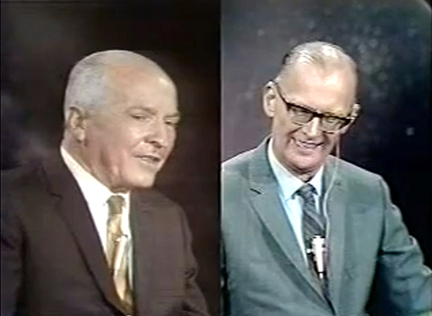|
|||||||||||||||||
November 2009 Web Edition Issue #3 |
|||||||||||||||||
|
Mondo Cult
Forum
Blog
News
Mondo Girl
Letters
Photo Galleries
Archives
Back Issues
Books
Contact Us
Features
Film
Index
Interviews
Legal
Links
Music
Staff
|

July 20, 1969I remember sitting on the floor of the living room in Hartsville, MA. My dad and mom were there as was my Grandma, May Bowe. I guess my brother must have been there as well, though frankly, I don’t remember. We were watching Walter Cronkite interview Clarke & Heinlein as we waited to see an American walk on the moon. I remember what Robert Heinlein said about it to this very day. I have never forgotten his words, nor have I forgotten my father’s. He was crying when Armstrong walked on the moon, and I asked him why. He said, quite simply, “Because we did it.” My dad was a physicist; one of the many inspired by science fiction stories from the early earlier part of the 20th century. When Brad called to tell me that we were going to do this Heinlein tribute and top it off with this wonderful interview, I couldn’t wait to get off the phone so I could get started! I couldn’t start though. No one had written anything yet! It's taken several months, and the gents all finally wrote stuff. By God, they did! And now, here we are at the end of Mondo Heinlein. What a perfect way to close. —Jessie Lilley“This is the biggest day the human race has ever seen.”Robert A. Heinlein on the 1969 Moon LandingOn July 20, 1969, CBS anchor Walter Cronkite interviewed the two most famous science-fiction authors whose work had inspired a generation of scientists and engineers to attempt the moon landing. Robert A. Heinlein wrote the 1947 novel Rocket Ship Galileo. Heinlein participated in the adaptation and filming of the 1950 George Pal movie Destination Moon. 
Old friends Robert A. Heinlein and Arthur C. Clarke chat with Walter Cronkite about the "the biggest day the human race has ever seen". Arthur C. Clarke had described communication satellites in a 1945 article so precisely that if he had applied for a patent it most likely would have been granted. The year before the Apollo 11 moon landing the movie 2001: A Space Odyssey, which Clarke had co-written with director Stanley Kubrick, described a future in which humans had established a moon base. Walter Cronkite, in addition to being CBS's signature face of news, was a genuine space enthusiast. Walter Cronkite sits in CBS's New York City studio with Arthur C. Clarke. Correspondent Bill Stout (not to be confused with artist William Stout) begins the Heinlein interview sitting in front of TV cameras at North American Rockwell in Downey, California. Note when Heinlein says, "We are about to make that one step from Tranquility Base in a matter of minutes now." Heinlein says this on CBS before Neil Armstrong says from the moon, "One small step." This archived CBS interview has never before been publicly released, and no copyright for it can be found. Since it originates in 1969 and no record can be found for a renewed copyright claim I conclude that in 2015 this is in the public domain. If CBS contests this I will take it down under the safe harbor of the Digital Millennium Copyright Act. However as of September 10, 2016--after initially blocking the video--CBS has removed its block and is only restricting embedding this video on other websites. Thank you, CBS! —J. Neil Schulman | ||||||||||||||||















